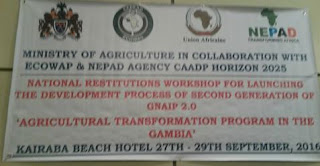The Ministry
of Agriculture (MoA) in collaboration with ECOWAP, NEPAD and CAADP Horizon 2025,
convey a three days workshop from the 27th to 29th
September, 2016 at the Kairaba Beach Hotel.
The deputy minister of Agriculture, Mr.
Sherriffo Bojang, presided over the official opening on behalf of the minister.
The
restitution workshop is to launch the development process of the second
generation of the Gambia National Agricultural Investment Plan-GNAIP 2.0 for agricultural transformation in The Gambia.
GNAIP is
the national blueprint for the development of Gambia’s agriculture sector.
Deputy
minister Bojang stated that the next generation of GNAIP should include
development of an inclusive approach, the inclusion of women and youth,
rethinking in agricultural development, develop value chains, and support to
enable agricultural productivity.
Mr. Bojang
said there has been renewed commitment to the African Union Commission/New
Partnership for Africa Development-pioneered process for the development of
comprehensive regional agricultural programme.
This is in
pursuit of Africa agricultural growth and transformation goal for the period
2016-2025 endorsed by the African Union heads of states and governments in
Malabo in 2014.
He was quick
to admit that the effort of the country in the implementation of GNAIP 1.0 was
challenged especially with regards to funding, leading to low achievement of
set targets.
He went on to say that the
development of comprehensive agricultural process entailed developing regional
agricultural investment plans, and national agricultural and food security
investment plans.
The deputy
minister noted that it is through accelerating agricultural transformation in
The Gambia that the country be self-sufficient in food.
He adds; “Indeed,
the country has achieved a significant progress over the last ten years in the
areas of land development, water control, input supply, partnership
development, modernisation of equipment and strategic plan development,” he
said.
“We must also develop
advocacy for better repositioning of agriculture on the agenda nationally,” he
affirmed.
Speaking on behalf of CSO, Producer organisations,
Gender Network & Private Sector, Mrs. Fatou Samba Njie says farmers should
not be left out in the implementation adding that "help farmers who are
producing your food on your table".
Day 2: Panel discussions- Non State Actors, Private
Sector, Gender Network, CSOs, NYC & Nedi Gambia.Panelists concurred that youth should be fully involved in the designing and
the implementation of the GNAIP 2.


No comments:
Post a Comment